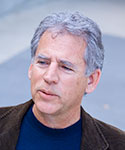
Thomas Levy
Distinguished Professor, Graduate Division

- Profile
Profile
Thomas Evan Levy is Distinguished Professor of the Graduate Division and inaugural holder of the Norma Kershaw Chair in the Archaeology of Ancient Israel and Neighboring Lands in the Department of Anthropology at the UC San Diego. He is founder and co-director of the Center for Cyber-archaeology and Sustainability (CCAS) at the Qualcomm Institute, California Center of Telecommunications and Information Technology (Calit2) at UC San Diego and served as co-director of the new Scripps Center for Marine Archaeology at UC San Diego for five years.
Professor Levy has published 15 books and over 250 scholarly articles. Levy is editor-in-chief of Approaches to Anthropological Archaeology (Equinox: UK) and co-editor of Quantitative Methods in the Humanities and Social Sciences (Springer: NY). Elected to the American Academy of Arts and Sciences, Levy is a Levantine field archaeologist with interests in the role of technology, especially early mining and metallurgy, on social evolution from the beginnings of sedentism and the domestication of plants and animals in the Pre-Pottery Neolithic period (ca. 7500 BCE) to the rise of the first historic Levantine state level societies in the Iron Age (ca. 1200 – 500 BCE); and human adaptation to coastal environments in the Eastern Mediterranean during the Holocene.
A Fellow of the Explorers Club, Levy won the 2011 Lowell Thomas Award for “Exploring the World’s Greatest Mysteries.” Levy has been the principal investigator of many interdisciplinary archaeological field projects in Israel, Jordan and most recently in Greece, that have been funded by the National Geographic Society, the National Endowment for the Humanities, National Science Foundation, and other organizations. Levy also conducts ethnoarchaeological research in India. Together with his wife Alina Levy and the Sthapathy traditional craftsmen from the village of Swamimalai, they co-authored the book Masters of Fire - Hereditary Bronze Casters of South India. Bochum: German Mining Museum, 2008
Levy served as Principal Investigator for the 2-year University of California Office of the President Catalyst grant ($1.07 million) 2016 – 2018 that focused on ‘At-Risk World Heritage and the Digital Humanities’; he is an adjunct professor at the University of Cyprus and has served as PI of the Kastrouli Land & Sea Late Mycenaean Settlement Project (Phokis, Greece) with colleagues at the University of the Aegean, and currently co-directs the Methoni Bay Cultural Heritage Project with Prof. George Papatheodorou of the University of Patras, Greece. Currently, Tom is PI of the UC San Diego Koret Carmel Coast Israel Project (+ $1.3 million) with Prof. Assaf Yasur-Landau of the School of Archaeology, University of Haifa, Israel.
In 2021, Prof. Levy and colleagues from the Scripps Center for Marine Archaeology at UC San Diego and the Leon Recanati Institute for Maritime Studies at the University of Haifa in Israel were awarded the 2021 CENIC Innovations in Networking Award for Research Applications. “One of the original goals of CENIC’s California Research and Education Network (CalREN) was to break down the barriers of distance and time in order to facilitate effective research and education,” said CENIC President and CEO Louis Fox. “The work of the California and Israeli research teams who were able to use the Pacific Research Platform to adapt and expand their research goals, imagine greater possibilities, and create new models of research collaboration, despite the challenges of the COVID-19 pandemic, is immensely creative and inspiring.”
